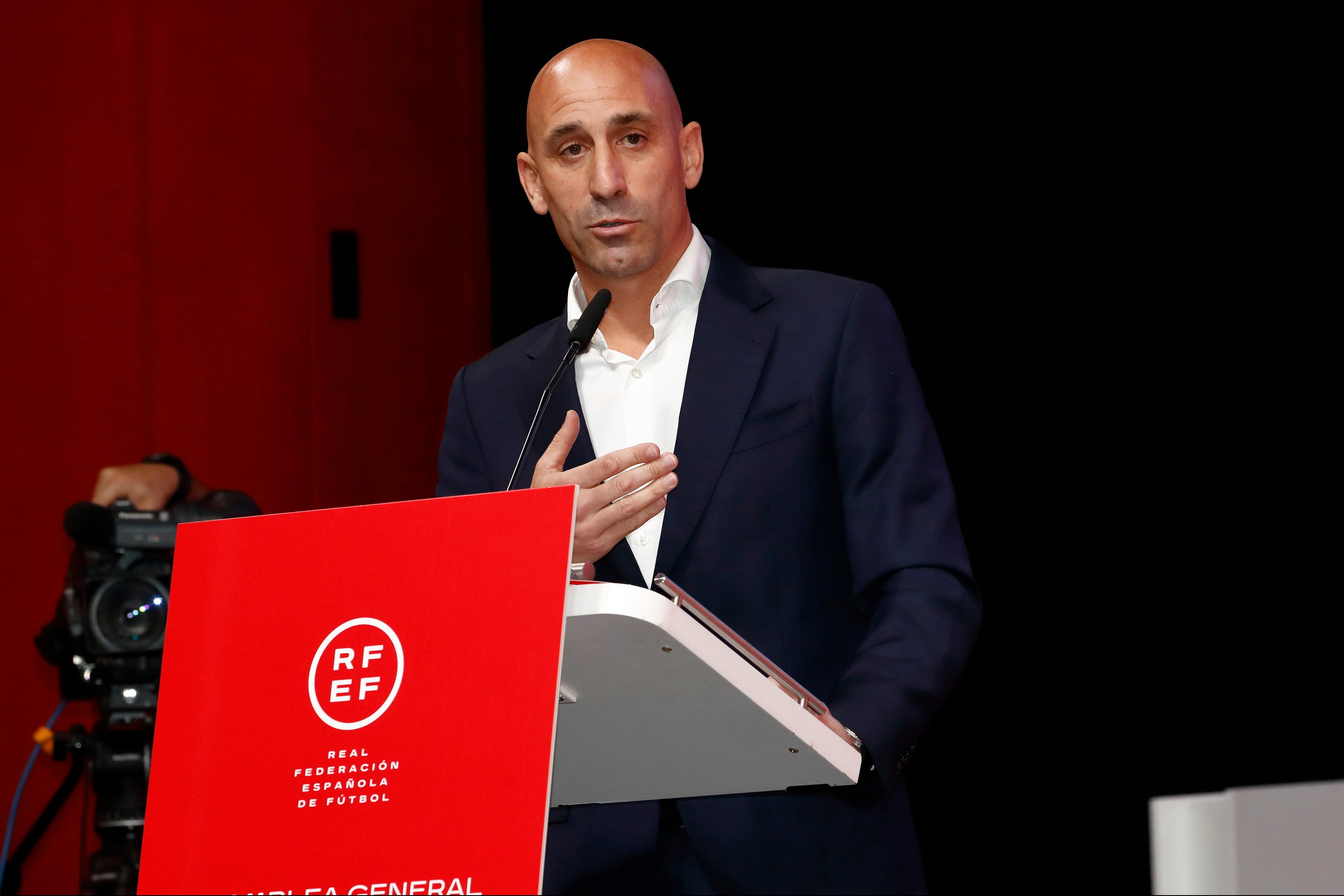Is the World Cup kiss Spain’s Me Too moment?
…not if the sexist, bullying, groin-grabbing men who run the game have anything to do with it, writes Jim White. Which is why football needs a revolution – not just another set piece from the Trump playbook


Imagine, for a moment, the world’s worst fantasy dinner party. Donald Trump is there with his mate Vladimir Putin. Dan Wootton of GB News is in full anti-woke flow. Nadine Dorries is loudly guffawing at everything Boris Johnson says.
Around the table, self-congratulation is the principal topic of conversation. Everyone is enjoying this celebration of the architects of post-truth. Then, suddenly, all eyes are drawn to the one guest nobody had heard of until last week: Luis Rubiales, the Spanish football administrator and a man previously barely recognised beyond the confines of his own front room (and certainly not in his own kitchen: that’s where women go).
Fearful that others are hogging the limelight, he congratulates the hostess for the quality of her cooking by grabbing her in an aggressive embrace, before giving her a full-on smacker on the lips and clutching at his groin in an unmistakable gesture of sexual self-aggrandisement.
When she looks a touch discombobulated, he launches a vociferous attack on her, accusing her of conducting a vendetta against him. He will sue for defamation, he says as he throws the food across the table. And if she carries on with her insulting attacks on his integrity, then he has no alternative: he will instruct his mum to lock herself in her local church and go on hunger strike in protest.
If that reads like the plot of a particularly unlikely episode of Black Mirror, what has been going on in Spain these past few days has been no less ridiculous. After the country’s women’s team won the World Cup, there has barely been time or space to talk about the brilliance of their play or the meaning of their achievement.
Rather, Rubiales has entirely seized the attention. After being accused of being a touch over-familiar in his post-match reaction to the midfielder Jennifer Hermoso, he doubled down. Instead of apologising for any affront caused by his heat of the moment excitement, he went on the warpath.
Borrowing unashamedly from the Trump playbook, he insisted he had done nothing wrong, casting himself as the victim of a conspiracy of dangerous forces. He doggedly insisted that what appeared to be unarguable facts were deliberately manipulated falsehoods. Fake news. This was not so much mansplaining as mansploding, putting a bomb under any potential celebration of female achievement.
Yet, for all his noisy bluster, for all the unrepentant certainty in his tone, for all his cavalier embrace of victimhood, it appears that Rubiales’s absurdist campaign of deflection is about to reach the end of the road. The one thing he appears to have done is unite everyone against him. From the Spanish government, through the entire Iberian football establishment to that bastion of feminism and female advancement Fifa, noone is left on his team.
Even the Spanish FA, until last week a body entirely cowed by their leader, have suggested he go.
And for Spain, indeed the world of football, the most pressing question is this: what comes next? What lessons might be learned from this preposterous farrago? How can the game make itself better governed?
Well, for a start, it would be good if lessons were finally learned. During the recent World Cup, the chief executive of Fifa, Gianni Infantino, delivered a patronising speech about how change in the women’s game must be driven by the women themselves. Knock on our door and we blokes will do our best to help, was the gist of his argument. But Spain’s female players had been making it pretty clear there was something nasty in their country’s footballing woodshed for years.
Back in 2015, the women who had just competed in the World Cup issued a statement condemning the attitude of their coach Ignacio Quereda. He was, they suggested, a bully; intolerant, dismissive and over physical. And footage of a routine training session in which he frequently slapped, prodded and squeezed his players suggested they were not exaggerating. Quereda eventually resigned in a Johnsonian huff. But nothing fundamentally changed.
In 2018, Rubiales installed his mate, and the bloke who had helped him get elected to the Spanish association presidency, Jorge Vilda. By 2022, a year before the World Cup, 15 players refused to work with Vilda anymore.
Instead of listening to their complaints, Rubiales consulted his Trump manual. They were informed they were troublemakers, stirrers, uppity feminists. Vilda remained in position and only three of the 15 were selected for this year’s competition.
Football’s routine answer always is: it is just one bad apple. Except, every time, it appears the entire barrel is rotting. Because football has long been a business particularly prone to the advancement of wrong uns. From Joao Havelange through Sepp Blatter to Infantino and Rubiales, those in positions of power have forever prioritised self-advancement. Below them are systems designed to enable rather than challenge.
Just look at the faceless bureaucrats at the Spanish FA who agreed with their boss it really was a good idea to threaten to sue one of the heroines of the hour for falsehood. And never mind knocking on the door, the response to any complaint has always been the same: blame the complainant. Reports of racism, of misogyny, of homophobia are routinely treated in the same manner. Don’t get uppity, don’t rock the boat, just work harder and things will be all right.
In Spain, the suggestion has been that the Rubiales fiasco will turn out to be the country’s MeToo –moment. That “Se Acabo” – “this is over”, the slogan chanted on many a protest this last week – will be the trigger to proper change. To which the only response is: not if the men in charge can help it.
What this week has demonstrated is that football needs a wholesale revolution. And those running it will do their level best to ensure that never happens.






Join our commenting forum
Join thought-provoking conversations, follow other Independent readers and see their replies
Comments